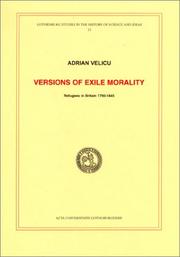| Listing 1 - 10 of 35 | << page >> |
Sort by
|

ISBN: 1282088815 9786612088810 0300145071 9780300145076 9781282088818 9780300122411 0300122411 6612088818 Year: 2007 Publisher: New Haven Yale University Press
Abstract | Keywords | Export | Availability | Bookmark
 Loading...
Loading...Choose an application
- Reference Manager
- EndNote
- RefWorks (Direct export to RefWorks)
Having emerged, exhausted but triumphant, from the bloody and divisive Russian Civil War, V. I. Lenin and his colleagues turned to eliminating perceived ideological foes from within. In On the Ideological Front, Stuart Finkel tells the story of the1922 expulsion from Soviet Russia of almost one hundred prominent intellectuals, including professors and journalists, philosophers and engineers, writers and agronomists. Finkel's meticulously researched and persuasively argued study sets this compelling human drama within the context of the Bolsheviks' determined efforts to impose ideological conformity, redefine the role of the intelligentsia, and establish a distinctly Soviet public sphere. The book demonstrates that the NEP period was not a time of intellectual pluralism and ideological retreat on the part of the Bolsheviks. On the contrary, from its formative years, the Soviet regime zealously policed the ideological front and laid the institutional and discursive foundations for the Stalinist state.
Intellectuals --- Exile (Punishment) --- Banishment --- Deportation as a punishment --- Ostracism (Exile) --- Alternatives to imprisonment --- History.
Book
ISBN: 9074622232 Year: 2002 Publisher: Leiden Menken Kasander en Wigman
Abstract | Keywords | Export | Availability | Bookmark
 Loading...
Loading...Choose an application
- Reference Manager
- EndNote
- RefWorks (Direct export to RefWorks)
Exile (Punishment) --- Merchant mariners --- Merchant marine --- Merchant seamen --- Sailors --- Banishment --- Deportation as a punishment --- Ostracism (Exile) --- Alternatives to imprisonment --- History --- Personnel --- Hasenbosch, Leendert, --- Dutch literature
Book
ISBN: 3476006069 9783476006066 Year: 1986 Publisher: Stuttgart: J. B. Metzler,
Abstract | Keywords | Export | Availability | Bookmark
 Loading...
Loading...Choose an application
- Reference Manager
- EndNote
- RefWorks (Direct export to RefWorks)
Comparative literature --- Kafka, Franz --- Deportation in literature --- Exile (punishment) --- Deportation (Roman law) --- History --- Kafka, Franz, --- Deportation --- -Deportation (Roman law) --- -Banishment --- Deportation as a punishment --- Ostracism (Exile) --- Alternatives to imprisonment --- Roman law --- Expulsion --- Emigration and immigration law --- Asylum, Right of --- Extradition --- Refoulement --- Law and legislation --- -History --- Banishment --- Exile (punishment) - Europe - History --- Kafka, Franz, - 1883-1924. - In der Strafkolonie
Book
ISBN: 9781316501122 9780511581373 9780521517355 0511581378 9780511539794 0511539797 9780511540738 0511540736 0521517354 9780511538957 0511538952 9780511538957 1316501124 1107191351 1282155636 9786612155635 0511540396 051153812X Year: 2009 Publisher: Cambridge New York
Abstract | Keywords | Export | Availability | Bookmark
 Loading...
Loading...Choose an application
- Reference Manager
- EndNote
- RefWorks (Direct export to RefWorks)
The Politics of Exile in Latin America addresses exile as a major mechanism of institutional exclusion used by all types of governments in the region against their own citizens, while they often provided asylum to aliens fleeing persecution. The work is the first systematic analysis of Latin American exile on a continental and transnational basis and on a long-term perspective. It traces variations in the saliency of exile among different expelling and receiving countries; across different periods; with different paths of exile, both elite and massive; and under authoritarian and democratic contexts. The project integrates theoretical hindsight and empirical findings, analyzing the importance of exile as a recent and contemporary phenomenon, while reaching back to its origins and phases of development. It also addresses presidential exile, the formation of Latin American communities of exiles worldwide, and the role of exiles in shaping the collective identities of these countries.
Exile (Punishment) --- Exiles --- Statelessness --- Psychology. --- Social conditions. --- Latin America --- Politics and government. --- Citizenship --- Public law --- Expatriation --- Stateless persons --- Persons --- Aliens --- Deportees --- Refugees --- Banishment --- Deportation as a punishment --- Ostracism (Exile) --- Alternatives to imprisonment --- Law and legislation --- Social Sciences --- Political Science
Book
ISBN: 9781496203144 1496203143 9780803299597 149620316X Year: 2017 Publisher: Lincoln
Abstract | Keywords | Export | Availability | Bookmark
 Loading...
Loading...Choose an application
- Reference Manager
- EndNote
- RefWorks (Direct export to RefWorks)
Political prisoners --- Exile (Punishment) --- Banishment --- Deportation as a punishment --- Ostracism (Exile) --- Alternatives to imprisonment --- Šimaitė, Ona, --- Šukys, Julija --- Exile. --- Family. --- Shuḳis, Yuliyah --- שוקים, יוליה --- Shimayeṭeh, Onah,
Book
ISBN: 1283036045 9786613036049 0822391341 0822345617 0822345765 Year: 2010 Publisher: Durham, NC : Duke University Press,
Abstract | Keywords | Export | Availability | Bookmark
 Loading...
Loading...Choose an application
- Reference Manager
- EndNote
- RefWorks (Direct export to RefWorks)
A collection exploring practices and experiences of deportation, and the threat of deportation, in regional and national settings from the U.S.-Mexico border to Israel, and from Somalia to Switzerland.
Deportation. --- Exile (Punishment) --- Banishment --- Deportation as a punishment --- Ostracism (Exile) --- Alternatives to imprisonment --- Deportation --- Expulsion --- Emigration and immigration law --- Asylum, Right of --- Extradition --- Refoulement --- Law and legislation --- UmU kursbok
Book
ISBN: 1283898209 0812206479 0812244273 Year: 2012 Publisher: Philadelphia : University of Pennsylvania Press,
Abstract | Keywords | Export | Availability | Bookmark
 Loading...
Loading...Choose an application
- Reference Manager
- EndNote
- RefWorks (Direct export to RefWorks)
A community is defined not only by inclusion but also by exclusion. Seventeenth-century New England Puritans, themselves exiled from one society, ruthlessly invoked the law of banishment from another: over time, hundreds of people were forcibly excluded from this developing but sparsely settled colony. Nan Goodman suggests that the methods of banishment rivaled-even overpowered-contractual and constitutional methods of inclusion as the means of defining people and place. The law and rhetoric that enacted the exclusion of certain parties, she contends, had the inverse effect of strengthening the connections and collective identity of those that remained. Banished investigates the practices of social exclusion and its implications through the lens of the period's common law. For Goodman, common law is a site of negotiation where the concepts of community and territory are more fluid and elastic than has previously been assumed for Puritan society. Her legal history brings fresh insight to well-known as well as more obscure banishment cases, including those of Anne Hutchinson, Roger Williams, Thomas Morton, the Quakers, and the Indians banished to Deer Island during King Philip's War. Many of these cases were driven less by the religious violations that may have triggered them than by the establishment of rules for membership in a civil society. Law provided a language for the Puritans to know and say who they were-and who they were not. Banished reveals the Puritans' previously neglected investment in the legal rhetoric that continues to shape our understanding of borders, boundaries, and social exclusion.
Puritans --- Common law --- Exile (Punishment) --- Anglo-American law --- Law, Anglo-American --- Customary law --- Banishment --- Deportation as a punishment --- Ostracism (Exile) --- Alternatives to imprisonment --- History --- New England --- Northeastern States --- Civilization --- American History. --- American Studies. --- Cultural Studies. --- Law. --- Literature.
Book
ISBN: 9789004161740 9004161740 9786612397578 1282397575 9047442792 9789047442790 9781282397576 Year: 2008 Publisher: Leiden Boston
Abstract | Keywords | Export | Availability | Bookmark
 Loading...
Loading...Choose an application
- Reference Manager
- EndNote
- RefWorks (Direct export to RefWorks)
Banishment was crucial to law enforcement in early modern Europe, as magistrates used expulsion to punish and control thousands of offenders convicted of crimes ranging from adultery to theft. While early modern social control has attracted considerable scholarly attention in recent decades, banishment has been largely neglected. This book examines the role of banishment in sixteenth-century Ulm, an important south German city-state, using the town’s experience to uncover how early modern magistrates used expulsion to regulate and reorder society. This investigation sheds new light on the application of authority, the intersection between official disciplinary efforts and customary behavioral norms, and the function of public expulsion in displaying and defending social hierarchies, issues central to our historical understanding of the period.
History of the law --- History of Germany and Austria --- anno 1500-1599 --- Ulm --- Exile (Punishment) --- Ulm (Germany) --- History --- Social conditions --- Exile (Punishment) -- Germany -- Ulm -- 16th century. --- Ulm (Germany) -- History -- 16th century. --- Ulm (Germany) -- Social conditions -- 16th century. --- Germany --- Regions & Countries - Europe --- History & Archaeology --- Banishment --- Deportation as a punishment --- Ostracism (Exile) --- Alternatives to imprisonment

ISBN: 917346399X Year: 2001 Publisher: Göteborg Acta universitatis Gothoburgensis
Abstract | Keywords | Export | Availability | Bookmark
 Loading...
Loading...Choose an application
- Reference Manager
- EndNote
- RefWorks (Direct export to RefWorks)
Deportation --- -Exile (Punishment) --- -Refugees --- -Displaced persons --- Persons --- Aliens --- Deportees --- Exiles --- Banishment --- Deportation as a punishment --- Ostracism (Exile) --- Alternatives to imprisonment --- Expulsion --- Emigration and immigration law --- Asylum, Right of --- Extradition --- Refoulement --- History --- Law and legislation --- England --- Emigration and immigration. --- Intellectual life --- -Deportation --- Exile (Punishment) --- Refugees --- History. --- -History --- Displaced persons
Book
ISBN: 9781433123573 1433123576 Year: 2013 Publisher: New York Lang
Abstract | Keywords | Export | Availability | Bookmark
 Loading...
Loading...Choose an application
- Reference Manager
- EndNote
- RefWorks (Direct export to RefWorks)
Exile (Punishment) --- Outlaws --- Common law --- Law, Medieval. --- Bannissement --- Hors-la-loi --- Droit médiéval --- History --- History. --- Histoire --- Great Britain --- Grande-Bretagne --- Law, Medieval --- Medieval law --- Banishment --- Deportation as a punishment --- Ostracism (Exile) --- Alternatives to imprisonment --- Bandits --- Criminals --- Brigands and robbers --- Outcasts --- Anglo-American law --- Law, Anglo-American --- Customary law
| Listing 1 - 10 of 35 | << page >> |
Sort by
|

 Search
Search Feedback
Feedback About UniCat
About UniCat  Help
Help News
News